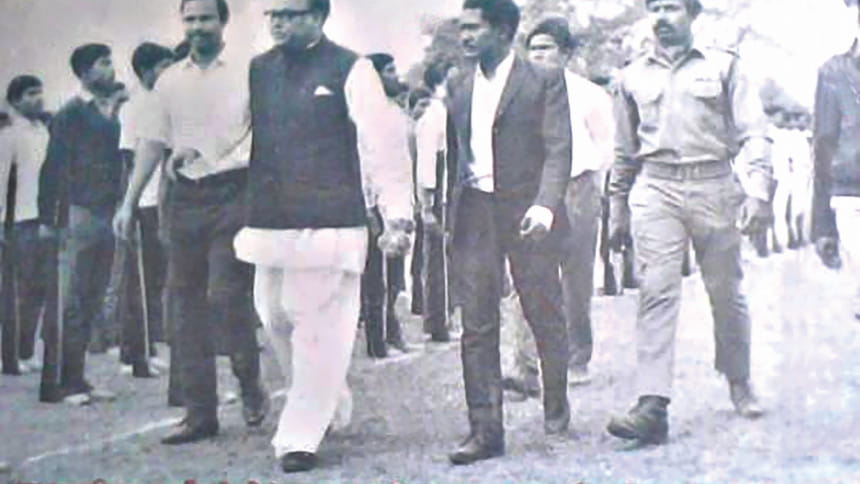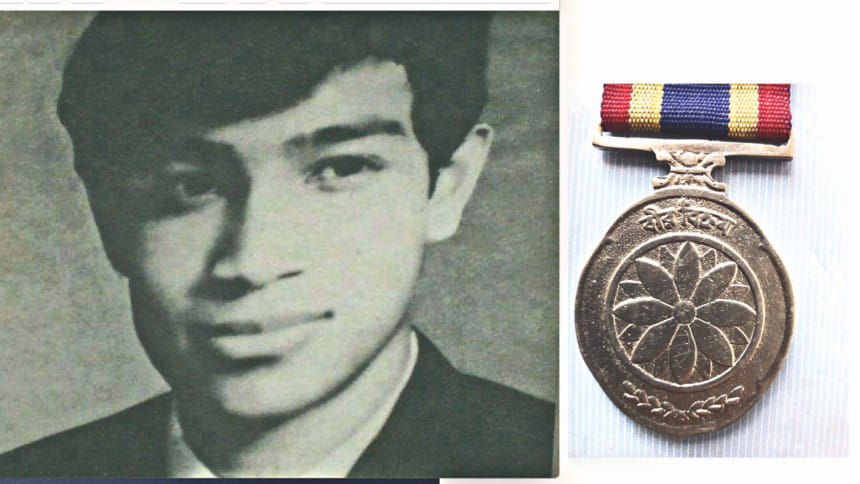Memories at War

I often consider war as a quasi-synonym for memory. After all, memory is nothing but our present in constant war with our glorified, vilified, expressed, suppressed, erased, and fragmented selves floating in past space and time. Some memories make us strong, some break us into pieces, while some teach us hope and resilience. Some memories are what we remember, and some are what we think we remember. The latter are like the dreams that we try to recall after waking up and keep trying to remember the whole thing as if some parts of our existence depend on it. The liberation war is a battle ground of blurry memories that I keep trying to sort and restore. My father Abdullah Al Faruq was a government officer serving in Islamabad when the war broke out. We got stranded there and could not come back until 1973. I was too young at that time to grasp the meaning of a war or to retain clear memories.I remember the sounds of sirens and bombing, the cautious faces of my parents, with their ears glued to a small radio, the changing attitudes of our Pakistani neighbors, and the seemingly meaningless words written in Urdu on the windows and walls of the houses of our Bangladeshi neighbors.

Bangalee babu, Machli babu.The words had a rhythmic notation, especially when the older kids repeatedly chanted them in various intonations whenever they saw a Bangladeshi pass by:
Bangalee babu, machlee babu
Ban-gali bahabu
Mach-chali bahabuh….
The rhythmic tone was so mirthful and catchy that I used to think of it as a chant of admiration until I saw the impacts of those words on my father's face. He was walking home with some of his friends when some teen-age boys of the neighborhood jeered those words at them. From the sidewalk where I was playing, I could clearly see the shadow of pain clouding his face. To this day, my childhood Pakistan days haunt me with a stinky smell of fish.
My most vivid memory of the war is associated with a roomful of boxes and cartons marked with red cross signs. My father and his friends would come and store those boxes in our house and then take them away after a few days. Then they would come and refill that room with new boxes and then take them away again. My siblings and I loved playing in that storage room because of one very simple reason: the room smelled of fresh biscuits and dried fruits. Once in a while, Izler kaku would come and hang out with us and bring for us candies and biscuits. I called him 'Kaku,' and presumed him a close family member ignoring the fact that he was a white man and did not speak Bengali. I did not know back then that Izler kaku worked for the International Red Cross Relief Committee and that my father and his friends delivered those boxes to the quarantined camps that were set up all over Islamabad for the Bangladeshi people stranded in Pakistan. I also did not know that my father was the chairman of the Red Cross Repatriation Committee for the Bangladeshis stranded in Islamabad. Izler kaku usually came on weekends, and I remember waiting eagerly for him, not because of the long meetings that he had with my father and his friends, but because of the candies that he brought for me every time he visited us. To this day, I regret not knowing his last name. I have looked through the uploaded documents on international relief programs in the Red Cross website, searching for a man named Izler, who worked for the Red Cross in Islamabad in 1971 and helped my father and his friends with their relief work for the stranded Bangladeshi community. I was unable to find any paper trace of his name. My Izler kaku now exists in my memory as a precious treasure, and is stuck as a 4x6 photo in our olden and now obsolete family album.As the chairman of the Committee, my father was required to stay in Pakistan until the whole repatriation process was complete. When we were finally able to leave Pakistan in 1973, my parents packed some clothes and their five children and hopped on a Lahore bound bus with other repatriates to catch a flight to Dhaka. I remember how my mother cried when she had to leave everything behind, especially her favorite sewing machine.
A Pakistani gentleman from the neighborhood bought the sewing machine, along with a few sets of our furniture. I, however, did not understand why she was so angry at the man for buying those things. I really liked the man, because he was very polite with us and brought for us some individually wrapped packets of delicious halwa patty—the best halwa I have ever tasted. My memory of journey back home is associated with that mouthwatering halwa—sweet and crunchy.
The man who came to pick us up at the Dhaka Airport was very big and tall and had an even bigger smile hiding behind his mustache. He was talking to my father, calling him 'Boro bhai' –his older brother—and occasionally throwing warm smile at us. The man was introduced to us as our uncle. I had already heard stories about him and my other uncles who had fought for the country. Abdullah Al Saleh, the youngest of my uncles, joined the war when he was sixteen. My uncle Abdullah Al Mahmud, aka the mustached man was a student of Mymensingh Medical College during the war. I knew he was a freedom fighter, but I did not know back then that he was the commander of the 11th sub-sector that played a major role in liberating Mymensingh town and Muktagachha from Pakistani army's control. I also did not know that he was awarded the 'Bir Pratik' title for his heroic deeds. That day, at the Dhaka airport, my seven years old eyes only saw a big man with a ferocious mustache and instantly became scared. But the man, my uncle, was already brave enough to win his country's freedom, and therefore did not lack the courage to win his tiny niece's affection. He held my hand and picked up one of my four siblings and lead us to a free country waiting outside the airport.
I have a vaguely vivid memory of a little me, being carried around by my uncle Khurram (Shah Mutasim Billah) in his arms, in the backyard of my grandfather's house in the village. I call it 'vaguely vivid' because if I close my eyes, I could see his face so clearly that it hurts to think of the man whose life span was shorter than my memory, and yet, longer than life itself. The memory was so blurry that at one point I started thinking that it might be a figment of my imagination. Uncle Khurram died in 1971, when I was only five and stranded in Pakistan, and my memory of him carrying me around must have happened (if it did) before that. My mother came to the rescue of my memory, confirming the fact in the late 1970's we indeed visited Bangladesh and spent a few weeks at my father's parental house in the village in Sherpur, where I, being the firstborn niece of the family, did get the most attention from all my uncles and aunts. My memory did not betray me at all. Uncle Khurram did carry me in his arms during that time. And the following year, on December10, 1971, he died a hero fighting the enemies of his country at the battleground in Jamalpur, two hours before Jamalpur was declared free. He was only nineteen. The nation paid its tribute by declaring my uncle a Bir Bikram—the valiant hero of Bangladesh.
I was not there when my country waged the war against tyranny and oppression in 1971. I was too young to build my own memories of the nation in its making, let alone fight for it. And yet, I remember the war too clearly. I have seen its shadows and pangs and fears and sorrows in the eyes of my loved ones. I have seen it in the weary eyes of my elderly grandparents, who never cried but always remembered how much they sacrificed so that rest of us could reach a destination called 'freedom.'
Fayeza Hasanat is an academic, translator, and author. She teaches English at the University of Central Florida, USA. She is the author of The Bird Catcher and Other Stories (2018). Her published works of translation include Nawab Faizunnesa's Rupjalal (2009) and Neelima Ibrahim's Aami Birangana Bolchi (A War Heroine, I Speak, 2017).

 For all latest news, follow The Daily Star's Google News channel.
For all latest news, follow The Daily Star's Google News channel. 



Comments